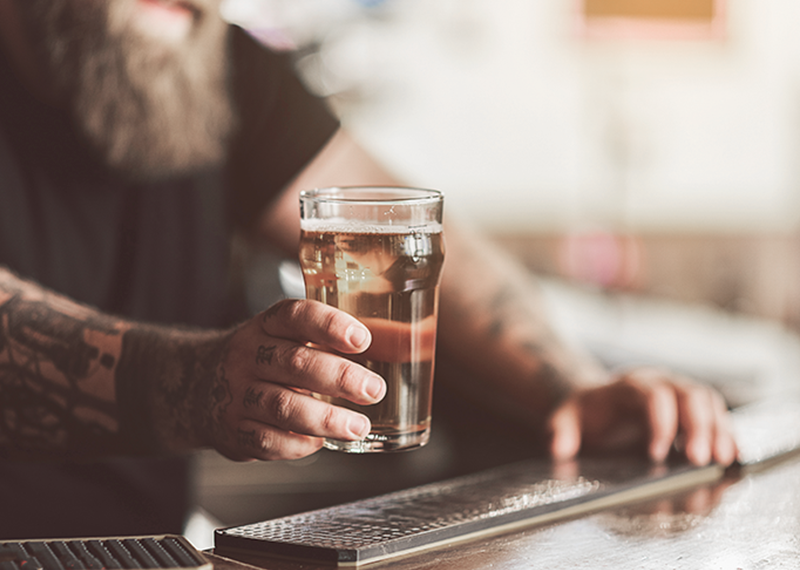I recently appeared on The Dr. Phil Show- I was asked to be an expert on a show dedicated to a guest who was on the verge of death from “black out” drinking. If you want to tune in, it was Season 18 Episode 38 “Black and Blue Blackout drunk.” I think it is common for people who drink too much to say “oh I was blacked out so I don’t remember.” But when does black out drinking turn from just too much drinking to a problematic deadly game.
Blackouts happen when you drink too much alcohol. Drinking quickly or drinking large amounts of alcohol raises your blood alcohol level (BAC). Blackouts usually start when your BAC reaches 0.15 or higher. A BAC level of 0.15 is considered very high; a BAC level of 0.08 means you’re legally drunk.
Being blackout drunk is considered “normal” in our society for several reasons. Lots of comedy movies feature main characters blacking out and having fun. College culture and binge drinking often go hand in hand, too. If blacking out is a regular occurrence, it may seem harmless. Between frat parties and off-campus get-togethers, it seems that heavy drinking is pretty normal. The truth is that blackout drinking isn’t about funny moments or bonding with friends. Blackouts can be a sign of trouble. This makes it important to know all of the facts. Read on to learn about this common drinking behavior and what it can lead to.
Have I had a black out?
Research says a blackout is a type of amnesia that happens when you’re drunk but still in a conscious state. People can act “normally” while in a black out- they can act normally while blacked out. Partial blackouts cause people to forget bits and pieces of time. Total black outs consist of people forget significant events and large amounts of time. So if you are wondering if you have had a black out, if you have had memory loss while drinking, you’ve experienced a blackout. Some people don’t know if they have had one because they ironically cannot remember. But if you wake up after drinking and cannot remember much about the night, how you got home etc. you have had a black out!
So is losing your memory while you are drinking that big of a deal? Memory loss or being a bit too drunk on occasion might not be a big deal. However, things can happen when you are walking around “appearing” to be normal, but in reality you have no idea what you are doing.
Why do I black out?
Blackouts happen when you drink too much alcohol. Drinking quickly or drinking large amounts of alcohol raises your blood alcohol level (BAC). Blackouts usually start when your BAC reaches 0.15 or higher. A BAC level of 0.15 is considered very high; a BAC level of 0.08 means you’re legally drunk. If your BAC reaches 0.15, you may experience:
- motor impairment
- loss of physical control
- blurry vision
- loss of balance
- increased anxiety
- blackouts
- decreased happiness and excitement
- severely impaired judgment and perception
In addition to drinking too much, other factors can increase your chances of blacking out. One common factor is drinking on an empty stomach. Your height, weight, and metabolism can also affect your blackout risk. There are a few tips you can try to prevent blacking out. You can read those in this post and learn how to practice safer drinking. But first, we’ll discuss the risks of drunk actions during blackouts.
Drunk Blackouts and Alcohol Poisoning
Dr. Phil confronted the guest on the show about his blacking out, memory loss, driving while drunk, falling and hurting himself and having the police come to the home…all while he had no memory of this. When Dr. Phil showed his guest a video of himself drunk, he was stunned.
The guest later said he was horrified to see himself in a drunken state and had no recollection of this behavior. Dr. Phil educated his viewers about alcohol poisoning so if you want to see his full explanation tune in to the show. You can type in to Google “Black and Blue Blackout drunk” to watch the show which aired Season 18 Episode 38.
You now know two important facts. First, you can blackout when your BAC reaches 0.15. Second, your drunk actions can be very dangerous. When you are blacked out, you might continue drinking alcohol without remembering it. You may also resist if people ask or tell you to stop drinking. This can result in alcohol poisoning.
Alcohol poisoning can happen when your BAC reaches 0.16 or higher. That means there is a very fine line between blackout levels and fatal levels of drinking. Alcohol poisoning requires medical intervention. Passing out with alcohol poisoning is the most dangerous outcome. Below are the symptoms of alcohol poisoning:
- vomiting
- seizures
- disorientation
- slow or irregular breathing
- pale or slightly blue skin
- decreased body temperature
- passing out from alcohol
- death
On the show, Dr. Phil confronted his guest on being close to death. The guest seemed to have no recollection of how close he was to death. Dr. Phil pointed out that the police were concerned he was close to death. The guest still had no recollection of how bad off he was.
If you or someone you’re drinking with experiences these signs, take action. Call 911 and give them as much information as possible. It’s also important not to leave someone with alcohol poisoning alone. Keeping them conscious is important.
Unfortunately, blacking out may cause you to wander off alone. And you may not be able to call 911 and keep yourself awake. You may also be less accepting of help and assistance from people around you. This is all a risky combination that you don’t want to face.
Overall, there is a direct link between blackout drinking and alcohol poisoning. This means it is important to stop blacking out when drinking. There is no foolproof solution besides staying sober. But you can take some basic steps to drink safely.
How can I stop blacking out when drinking?
There are a few things you can do to stop blackout drinking. These tips are pretty simple. Keep them in mind when you drink alcohol. They can prevent a lot of risks, problems, and danger.
- Eat a meal before you drink. Food in your stomach can help absorb alcohol. This prevents it from getting into your bloodstream quickly. Your chance of a high blood alcohol level is reduced.
- Drink water before you drink alcohol. If you drink alcohol while you’re thirsty, two things can happen. You’ll likely drink faster and drink more. This can lead to a blackout. Make sure you’re hydrated beforehand.
- Pace yourself when you drink alcohol. There’s no need to rush and have multiple drinks per hour. When you drink too fast, the chance of blacking out is high.
- Try to avoid drinking when you’re tired. Being tired can impact mental clarity, and alcohol can do the same thing. You may also be more likely to pass out or blackout if you are not well rested.
- Be very cautious if you take medication. Over the counter and prescription medications can be dangerous when combined with alcohol. Always check the label to see if there is a warning about alcohol. Follow the label’s directions to avoid blackouts and other dangerous health risks.
These instructions are easy enough to follow every time you drink. There is no 100% guarantee that you won’t blackout. But taking precautions can reduce your chances. You now know the dangers of getting blackout drunk. Why take the risk when you can prevent it?
If I am blacking out, do I have an alcohol problem?
Blacking out while drinking is a sign of alcohol abuse. If you regularly have drunk blackouts, it’s possible you have a drinking problem. Alcohol abuse and addiction can occur quickly. Overcoming these issues alone is very difficult and sometimes impossible.
There are some great resources available. Learning the signs of alcohol abuse and alcoholism is an important first step. This can help you realize if you or someone you know has a drinking problem. If you are questioning whether you have a problem there are easy online quizzes you can take to find out. You can also seek professional help by looking up a substance abuse counseling center or licensed professional in your area. Chances are if you think you have a problem, you do. Detoxification from alcohol can be dangerous, so do not consider doing this on your own if you drink regularly and want to quit. Consult a professional, even you internist to make sure that you are proceeding with you medical safety in mind.The “black and blue black out” guest accepted treatment while on the show! Check out my website for follow up video on how he is doing now!

